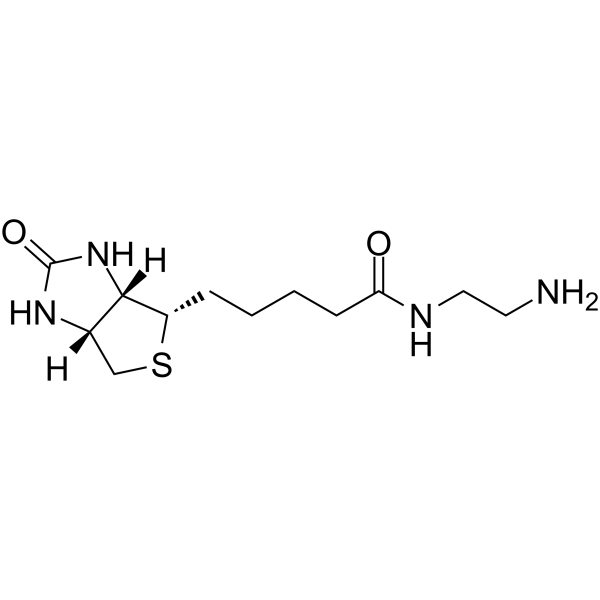
Biotin-EDA
CAS No. 111790-37-5
Biotin-EDA( —— )
Catalog No. M26901 CAS No. 111790-37-5
Biotin-EDA is an alkyl chain-based PROTAC linker that can be used in the synthesis of PROTACs.
Purity : >98% (HPLC)
 COA
COA
 Datasheet
Datasheet
 HNMR
HNMR
 HPLC
HPLC
 MSDS
MSDS
 Handing Instructions
Handing Instructions
| Size | Price / USD | Stock | Quantity |
| 10MG | 26 | Get Quote |


|
| 100MG | Get Quote | Get Quote |


|
| 200MG | Get Quote | Get Quote |


|
| 500MG | Get Quote | Get Quote |


|
| 1G | Get Quote | Get Quote |


|
Biological Information
-
Product NameBiotin-EDA
-
NoteResearch use only, not for human use.
-
Brief DescriptionBiotin-EDA is an alkyl chain-based PROTAC linker that can be used in the synthesis of PROTACs.
-
DescriptionBiotin-EDA is an alkyl chain-based PROTAC linker that can be used in the synthesis of PROTACs.(In Vitro):PROTACs contain two different ligands connected by a linker; one is a ligand for an E3 ubiquitin ligase and the other is for the target protein. PROTACs exploit the intracellular ubiquitin-proteasome system to selectively degrade target proteins.
-
In VitroPROTACs contain two different ligands connected by a linker; one is a ligand for an E3 ubiquitin ligase and the other is for the target protein. PROTACs exploit the intracellular ubiquitin-proteasome system to selectively degrade target proteins.
-
In Vivo——
-
Synonyms——
-
PathwayOthers
-
TargetOther Targets
-
RecptorSTING
-
Research Area——
-
Indication——
Chemical Information
-
CAS Number111790-37-5
-
Formula Weight286.39
-
Molecular FormulaC12H22N4O2S
-
Purity>98% (HPLC)
-
SolubilityIn Vitro:?DMSO : 50 mg/mL (174.59 mM)
-
SMILES[H][C@]12CS[C@@H](CCCCC(=O)NCCN)[C@@]1([H])NC(=O)N2
-
Chemical Name——
Shipping & Storage Information
-
Storage(-20℃)
-
ShippingWith Ice Pack
-
Stability≥ 2 years
Reference
1. Hong Z, et, al. STING inhibitors target the cyclic dinucleotide binding pocket. Proc Natl Acad Sci U S A. 2021 Jun 15;118(24):e2105465118.
molnova catalog



related products
-
Sesamol
Sesamol could decrease lung inflammation and lipopolysaccharide (LPS)-induced lung injury in rats.
-
Milatuzumab
Milatuzumab (MEDI-115) is a humanized monoclonal antibody against CD74. Milatuzumab promotes the production of free radical oxygen and the loss of mitochondrial membrane potential, reduces CD20/CD74 aggregates and cell adhesion, and induces cell death.
-
Suc-SDPF-pNA
Suc-SDPF-pNA



 Cart
Cart
 sales@molnova.com
sales@molnova.com


